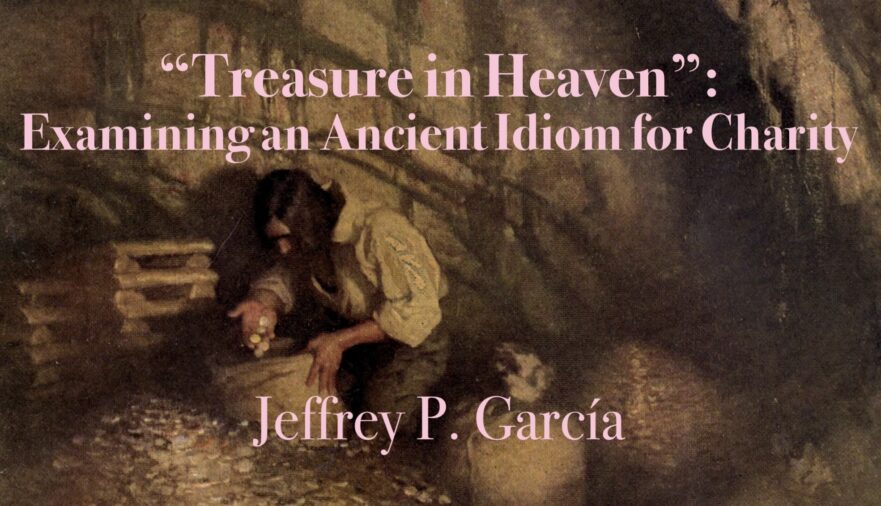For my brother, Jeff, whose charity towards me was always done with a “good heart;” truly he has stored his “treasure in heaven.”
Introduction
The growing value placed on charity in the first century C.E. cannot be overstated.[1] As a new sensitivity developed within Judaism that challenged the compensatory “blessings and curses” paradigm of the Hebrew Bible (cf. Deut. 28) as a basis to serve God, so there was a shifting emphasis towards altruistic love[2] embodied in the Levitical commandment, “…and you shall love your neighbor as yourself (וְאָהַבְתָּ לְרֵעֲךָ כָּמוֹךָ אֲנִי יי; Lev. 19:18).” This unique relationship between serving God without care of reward—that “the fear of heaven [God] be upon you” (m. Avot 1:3)—and loving your neighbor as yourself, that is, one who is like you[3] is reflected in contemporary linguistic-based exegesis that pairs Deut. 6:5 with Lev. 19:18.[4]
And you shall love the Lord with all you heart, soul, and might. וְאָהַבְתָּ אֵת יי אֱלֹהֶיךָ בְּכָל־לְבָבְךָ וּבְכָל־נַפְשְׁךָ וּבְכָל־מְאֹדֶךָ (Deut. 6:5)…. And you shall love your neighbor as yourself וְאָהַבְתָּ לְרֵעֲךָ כָּמוֹךָ אֲנִי יי…. (Lev. 19:18)[5]
Paid Content
Premium Members and Friends of JP must be logged in to access this content: Login
If you do not have a paid subscription, please consider registering as a Premium Member starting at $10/month (paid monthly) or only $5/month (paid annually): Register
One Time Purchase Rather Than Membership
Rather than purchasing a membership subscription, you may purchase access to this single page for $1.99 USD. To purchase access we strongly encourage users to first register for a free account with JP (Register), which will make the process of accessing your purchase much simpler. Once you have registered you may login and purchase access to this page at this link:
Conclusion
Returning to the focal point of our study, once again, Jesus’ teaching reflects the novel developments, which occurred within the landscape of Second Temple Jewish thought in the years prior to his birth; in particular, “that altruistic, social love achieved the highest value index by being considered the very essence of Judaism.”[6] Luke’s extended teaching on charity (c. 12) and the pericope of Rich Young Man (c. 18), when examined in light of Second Temple Judaism, provide a historical and cultural context for Jesus’ use of the term “treasure in heaven.” As noted above, in extra-biblical Jewish texts the concept of storing up treasure with God is clearly associated with almsgiving. In some cases this laying up of treasure appears to protect from death and perhaps even the Day of Judgment (Tob. 4). Almsgiving, however, takes on a special significance in Jesus’ ministry and such is partially described with idiomatic expression “treasure in heaven.” But this phraseology is not simply a monetary donation but, quite distinctly, involves the selling of all of one’s possessions and distributing it to the poor. Moreover, a comparison with other Hasidim reveals why Jesus told the Rich Young Man to sell “all” that he had. While this ran contrary to the limits set by the Rabbis, the “heroic almsgiving” was not unique to Jesus or what would later become Christianity, as contended by Anderson, but instead was part of the Hasidic stream of Jewish piety that chose a life of austerity and asceticism. This austere life of the Hasid appeared to emphasize caring for the poor, so much so that what one receives, even if miraculously given, is returned in full to those in need. Yet, for Jesus, storing “treasure in heaven” played one more important role in that it allows the kingdom of heaven on earth—God’s present rule that is intended to bring healing to the afflicted—to be realized by humanity through the practice of giving charity.
- [1] This paper was also presented during the ETS Northeast Regional Meeting (April 6th, 2013, Nyack, NY). ↩
- [2] David Flusser, “A New Senstivity in Judaism and the Christian Message” in Judaism and the Origins of Christianity (Jerusalem: Magnes Press, 1988), 469-489; repr. from HThR 61/2 (1968):107-127. Flusser draws a connection with this so-called new sensitivity and the statement of Antigonus of Sokho: “Do not be like servants who serve the master [God] on condition of receiving a reward, but [be] like servants who serve the master not on condition of receiving a reward, and let the awe [love] of Heaven be upon you (470).” ↩
- [3] It appears that the term כָּמוֹךָ could be understood as “one who is like yourself.” Notley has noted, “The definition is not, in fact, an external one, but a challenge for us to recognize that in each person we can find both good and bad—just like ourselves. We are to love even those we do not deem worthy, because we ourselves stand unworthily in need of God’s mercy (R. Steven Notley, Jesus Jewish Command to Love).” ↩
- [4] See R. Steven Notley and Jeffrey P. García, “Hebrew-Only Exegesis: A Philological Approach to Jesus’ Use of the Hebrew Bible” in The Language Environment of First Century Judaea: Jerusalem Studies in the Synoptic Studies (JCP 26; Leiden: Brill, 2014), 349-374. ↩
- [5] The first evidence of such a unique pairing occurs is in the book of Jubilees (36:7-8); See Flusser, “A New Sensitivity,” 474. ↩
- [6] Flusser, “A New Sensitivity,” 474. ↩
































































































Comments 1
Always learning from you Bro! Nice to see your scribal scribbles on the Jerusalem perspective sizzle. NYC Represent:) Not scholarly posting but you know sup!